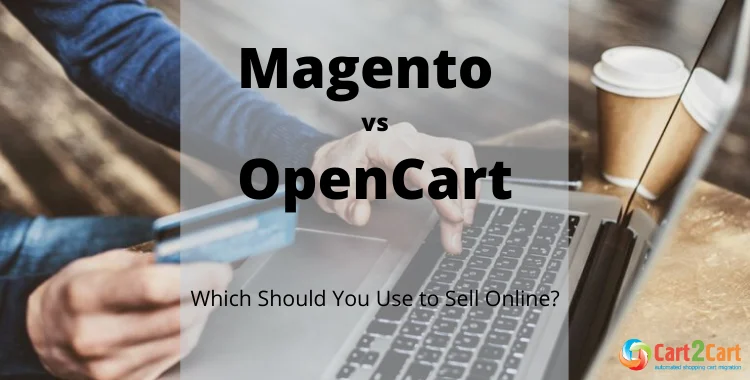Needless to say that shopping cart is considered to be the key to an online store's success that’s why it is so important to choose the proper one which will suit your business needs and requirements best. Making the right decision between Magento and OpenCart is a difficult task faced by many entrepreneurs, but it is an important choice. So take your time to consider the advantages and disadvantages of these two shopping cart solutions and once done, get ready to take your online business a level up to success.
Magento and OpenCart have established themselves as one of the most stable and robust shopping carts that are currently available at the market. They both have a potential for becoming if not perfect, then very approximate to this definition. There is a good deal of debate on which one is better, but we consider them to be not one-to-one comparison. There are benefits and pitfalls in each of these platforms, that’s why the final choice between them is not an obvious one, and mostly depends on personal preferences and business requirements.
What are the key similiarities between Magento vs OpenCart?
Generally speaking, these two e-Commerce solutions have a lot in common. Both Magento and OpenCart are open source, developed in PHP, and free-to-download. Supporting multiple languages and currencies, each of them has gathered huge user & developer communities, which resulted in the creation of numerous custom extensions. Both platforms are powerful and functional enough to power stores of nearly any scale and fairly comprehensible.
What are the key differences between Magento vs OpenCart?
User-friendliness and capabilities
One of the greatest differences that set these two platforms apart is the management simplicity, or rather to say, the lack of it in Magento. Indeed, Magento’s learning curve is steep enough to confuse an average user and requires some amount of programming knowledge and technical expertise. As a result, quite often store owners are forced to hire a developer.
But as soon as Magento gets into a skillful pair of hands, this shopping cart is able to do about anything an e-merchant can dream of. Fully customizable design, utter flexibility, unlimited SEO resources and a countless number of advanced extensions - that’s how Magento justifies its complexity.
On the contrary, OpenCart is considerably easier to use and manage. Straightforward and intuitive, it’s able to get a business rolling within a few hours of setting it up. The lightweightness and simplicity of OpenCart, however, will cost you about 20% of functionality Magento users are so proud of.
This, basically, what lowers OpenCart demand among owners of big-sized stores, but gives an advantage in the competition for powering the smaller ones. Magento, on the other hand, is often considered to be “too much” for shops with a moderate product quantity, and a perfect match for bigger online retailers.
Popularity and community support
Historically, Magento has powered a significant portion of the eCommerce market. While its market share has evolved with the rise of other platforms, it remains a dominant force, especially for enterprise-level businesses. Google Trends provides the following figures regarding both cart's popularity:
As for support, both Magento and OpenCart have nurtured robust communities always ready to help a merchant in need. The number of Magento specialized programmers is incomparably bigger though, which is related to high technical requirements this platform imposes. However, quantity has nothing to do with quality, right?
Hosting and extensions costs
Nothing comes for nothing. Even though Magento and OpenCart are free to download and use, you’ll still need to pay for hosting, extensions and premium templates.
Magento, however, will cost you considerably more. Being a resource-demanding solution, it requires a strong (and expensive) hosting plan to support your store performance. Additionally, you’ll need to pay for most of the design templates, with premium options and advanced extensions often incurring significant costs. Such exorbitant price is, of course, more of the exception than the rule.
OpenCart, to the contrary, is much more lightweight, which means hosting expenditures will be less. Themes are also nearly twice as cheap compared to Magento ones, not to mention moderate extensions prices. This fact, however, results in a relatively humble variety of choice of the templates and plugins offered.
| Magento | OpenCart | |
| Cost | Free to use, but additional cost associated (hosting, domain, SSL) | Free to use, but additional cost associated (hosting, domain, SSL) |
| Performance | Optimized for high performance, though requires robust hosting. | Good performance due to its lightweight nature. |
| Ease of use |
|
|
| Theme | Thousands of free and paid themes available. | Hundreds of free and paid themes available. |
| SEO |
|
|
| Support | Active Magento Community (hundreds of thousands of members) |
|
| Security | Serious security which never ceases to monitor the platform for emerging security risks | Riskier security because its extensions are not under as much security as those developed for other platforms |
| Payment methods | Supports numerous major payment gateways out-of-the-box and via extensions. | A wide array of payment gateways (PayPal, FedEx,...) |
Hosting plans for Magento and OpenCart
Magento and OpenCart are both open source e-commerce platforms that can be hosted on various types of servers, including shared, virtual private, and dedicated servers. Each platform has specific hosting requirements.
Magento is a more complex platform that requires servers with significant processing power and memory for optimal performance. In contrast, OpenCart is a lightweight platform that can run efficiently on smaller shared servers. The exact hosting costs for either platform depend on the store's size and the type of hosting chosen.
Hosting a small OpenCart store may start from around $20-30 per month, while larger stores could incur costs upwards of $150-200 per month. For Magento, hosting a small store typically starts from around $50-100 per month, but robust enterprise-level hosting for large stores can frequently exceed $1,000 per month.
Self-managed solutions like Amazon Web Services and DigitalOcean offer more affordable hosting options, but they don't include server security, optimization, or platform-specific support.
Managed hosting providers like Nexcess take care of the maintenance and security of the hosting environment, allowing you to focus on growing your online business.
What are the Pros and Cons of Magento and OpenCart?
Roughly, we can narrow down the comparison of advantages and disadvantages of Magento and OpenCart to the following points:
Magento Advantages
- Highly scalable and customizable
- Matchless functionality level
- Ideal for Enterprise usage
- Extensive community
Magento Disadvantages
- Costly extensions
- Too many features useless for most stores
- Steep learning curve
- Performance much dependent on hosting
OpenCart Advantages
- Very easy to use
- Free and cheap extensions or themes
- Responsive and nimble admin UI
- Nice documentation
OpenCart Disadvantages
- Limited caching and SEO functions (extensions required)
- Tough to customize
- Not so good for big-sized stores
- Moderate community size
Which is better, OpenCart or Magento?
OpenCart is great if you’re trying to build a store on your own with minimum financial infusions, Magento, alternatively, is a perfect choice for bigger stores with bigger budgets. However, both shopping carts are good for what they’re designed to do - selling and bringing profits.
Magento vs OpenCart - FAQs
Is OpenCart good for SEO?
The OpenCart platform lacks some advanced SEO capabilities, and you'll need PHP coding skills to modify some important SEO factors, such as meta tags and 301 referrals.
Is Magento the best platform eCommerce platform?
Magento is one of the class-leading platforms trusted by hundreds of thousands of eCommerce stores. Magento (now Adobe Commerce) has consistently been named a leader in Gartner’s Magic Quadrant for Digital Commerce platforms for several consecutive years.
Though the platform’s technical knowledge and development expertise requirements are high, its advanced commerce capabilities, specifics that cater to B2B and B2C, frequent innovations, and out-of-the-box features make the platform a worthy contender.
Magento has three different versions – Magento Open Source, Magento Commerce, and Magento Commerce Cloud, which suits businesses of any size and eCommerce maturity.
What can we do for you?
Already have an online retailer built with OpenCart but planning to move to Magento? Migrate from OpenCart to Magento swiftly and easily using Cart2Cart. Or are you willing to do vice versa by switching from Magento to OpenCart? Automated Cart2Cart is still exactly what you need!
Monthly Update – March 2026
In March 2026, the integration of Artificial Intelligence (AI) continues to redefine the eCommerce landscape, significantly impacting platforms such as Magento (Adobe Commerce) and OpenCart. AI is increasingly vital for enhancing personalized shopping experiences, automating customer service through advanced chatbots, and optimizing inventory management with predictive analytics. For Magento, particularly within its Adobe Commerce ecosystem, AI-driven features are expanding, offering sophisticated tools for product recommendations, dynamic pricing strategies, and fraud detection. This allows larger enterprises to leverage data for hyper-targeted marketing and operational efficiencies. OpenCart users, while operating on a more lightweight platform, are also seeing the benefits of AI through various extensions that provide intelligent search functions, personalized product displays, and automated marketing campaigns. The trend emphasizes moving beyond basic automation to intelligent systems that learn and adapt, offering a competitive edge in a saturated market. Businesses on both platforms should prioritize exploring AI solutions to streamline operations, reduce manual effort, and deliver truly engaging and tailored customer journeys, ensuring they remain at the forefront of digital commerce innovation.
For more details, explore our FAQ section or schedule a call with a migration expert.









Comment by Maashree Tours and Travels
hi Taras,
loved to read about your tutorial on opencart. Hope you to gain more meaning full insight about openkart in future.thanks for help
God Speed….
regards
Sudhanshu
Comment by Alina Terebetska
Hi there,
Thanks a lot for your kind words! Please, don’t forget to share the post you like most of all. Hope to hear from you soon!